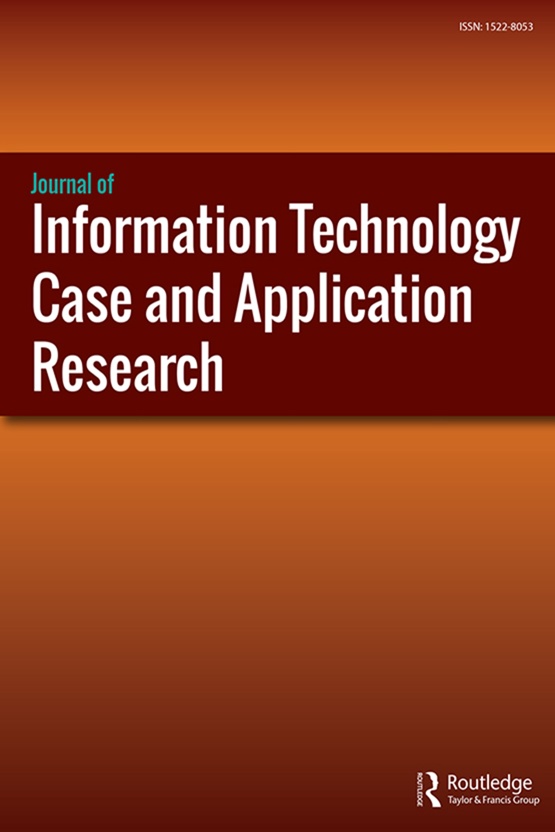Submit a Manuscript to the Journal
Journal of Information Technology Case and Application Research
For a Special Issue on
Digital Responsibility and Ethical Challenges with Digital Technologies: Empirics, Practices, and Applications
Manuscript deadline
31 January 2025

Special Issue Editor(s)
Nikolaus Obwegeser,
Bern University of Applied Sciences, Switzerland
[email protected]
Magie Hall,
University of Nebraska at Omaha, USA
[email protected]
George Grispos,
University of Nebraska at Omaha, USA
[email protected]
Marie Peskova,
Bern University of Applied Sciences, Switzerland
[email protected]
Digital Responsibility and Ethical Challenges with Digital Technologies: Empirics, Practices, and Applications
In recent years, organizations have faced ever-increasing pressure to face digitalization as one of the key topics that drive strategic agendas (Teubner & Stockinger, 2020). The development of new business models, products, and services to the digitalization and virtualization of key operating processes – a trend further accelerated by the CoViD-19 pandemic – is no longer just a topic that matters to “digital native” organizations (Bughin et al., 2020). Rather, incumbent businesses and their inherently non-digital business and operating models are also facing the need to step into the digital realm (Svahn et al., 2017). Consequently, more and more organizations seek guidance not only on what to digitalize, but rather on how to approach this step (Obwegeser et al., 2020). At the same time, in light of both social (e.g., scandals related to data leakages) and political pressures (e.g., regulatory advances such as the European Union’s GDPR and AI act initiatives), this how-question is not simply procedural or technical, but has become one related to norms and values (Leidner & Tona, 2021). In effect, key actors in organizations, from executives to employees, seek guidance on what norms and values define good behaviors in an increasingly digitized world, and ramp up their efforts to devise governance approaches that ensure corporate behaviors that comply with these norms across levels (Lobschat et al., 2021). Developing relevant insight to inform managerial practice and policymaking are at the heart of the emergent discourse on Digital Responsibility.
While recent trends show an increased activity on studying and conceptualising Digital Responsibility from an academic perspective, many organizations still struggle with the practical implications and lack systematic approaches. For practice-oriented disciplines with the intent to create a real world impact, such as information systems (IS) and computer science (CS), it is therefore crucial to better understand, analyse, and create a common basis to understand Ground Truth, i.e., what shapes the reality of Digital Responsibility in the everyday workings of organizations.
This Special Issue therefore invites researchers to contribute with empirical insights on the practices and applications of Digital Responsibility at all levels (personal, corporate, institutional and societal). We set a specific focus on empirics to advance the practical applications of Digital Responsibility, and close the theory-practice gap that is common to emerging topics in our academic discourse. We welcome innovative, rigorous, relevant and exciting research on Digital Responsibility with no limitations in terms of methodology or paradigmatic stance. We specifically encourage interdisciplinary work, as long as a substantive engagement with the academic discourse in relevant fields such as IS or CS is maintained.
Broadly, the topics and research areas that we are interested in for this SI include, but are not limited to:
- Success or failure (best-practice or post-mortem) case studies of organizations implementing various aspects of Digital Responsibility
- Analysis of real-world applications of novel or adapted Digital Responsibility frameworks
- Comparison of Digital Responsibility frameworks and practices across industries (i.e. forms of stakeholder engagement, integration into decision-processes)
- Design-science oriented research to guide future practice and research in the development and application of Digital Responsibility practices
- Studies that deepen our understanding of specific aspects of Digital Responsibility (e.g., Processes, Guidelines, Artefacts)
- Methodologies and metrics used by organizations to assess and control Digital Responsibility (i.e., measurements for digital inclusivity, sustainability initiatives, and the effectiveness of ethics training)
- Research focusing on Digital Responsibility Governance, i.e., how to distribute or centralise authority and responsibility for responsible conduct with new technologies
- Security, privacy and legal aspects associated with the implementation of Digital Responsibility within organizations
- Empirical works addressing public interest phenomenon or public interest organizations.
References
Bughin, J., Catlin, T., Hirt, M., & Willmott, P. (2020). Reimagining the post-pandemic organization. McKinsey & Company.
Leidner, D. E., & Tona, O. (2021). The CARE Theory of Dignity Amid Personal Data Digitalization. MIS Quarterly, 45(1).
Lobschat, L., Mueller, B., Eggers, F., Brandimarte, L., Diefenbach, S., Kroschke, M., & Wirtz, J. (2021). Corporate digital responsibility. Journal of Business Research, 122, 875-888.
Obwegeser, N., Yokoi, T., Wade, M., & Voskes, T. (2020). 7 key principles to govern digital initiatives. MIT Sloan Management Review, 61(3), 1-9.
Svahn, F., Mathiassen, L., & Lindgren, R. (2017). Embracing digital innovation in incumbent firms. MIS quarterly, 41(1), 239-254.
Teubner, R. A., & Stockhinger, J. (2020). Literature review: Understanding information systems strategy in the digital age. The Journal of Strategic Information Systems, 29(4), 101642.
Looking to Publish your Research?
Find out how to publish your research open access with Taylor & Francis Group.
Choose open accessSubmission Instructions
Please select "Digital Responsibility and Ethical Challenges with Digital Technologies: Empirics, Practices, and Applications” when submitting your paper online.
Peer review will be according to the journal guidelines, facilitated by the guest editors:
- Date first review round completed: 31 March 2025
- Date revised manuscripts due: 30 June 2025
- Date completion of the review and revision process (final notification): 30 September 2025
- Date online publication of the SI: 01 November 2025